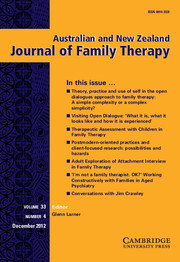Article contents
Multidimensional Family Therapy: A Science-Based Treatment System
Published online by Cambridge University Press: 02 March 2012
Abstract
Yes, I have heard about family psychotherapy — but opinions are no substitute for data. (Garfield, 1982)
MDFT is a family-based intervention for adolescent substance abuse and associated mental health and behavioural problems (Liddle, 2010). Integrative in several ways, MDFT uses an ecological or contextual conceptual framework to understand the developmental tasks of teens and their families. Research-derived knowledge about risk and protective factors, and proximal causes, correlates and contributors to adolescent drug and related problems inform clinical thinking and interventions with every case. A multisystems approach, MDFT assesses and intervenes in four areas: (1) the adolescent as an individual and a member of a family and peer network; (2) the parent(s), both as individual adults and in his or her role as mother, father or caregiver; (3) the family environment and family relationships, as manifested in day-to-day family transactional patterns; and (4) extrafamilial sources of influence such as peers, school and juvenile justice. Interventions are made within and coordinated across domains. Progress in one area or with one person has implications for and use in others. Individual meetings with parent(s) and teen set the stage for family sessions, and family meetings may offer content and new outcomes that need to be brought to extrafamily meetings with juvenile justice or school personnel. MDFT was developed and tested as a treatment system rather than a one-size-fits-all approach. A treatment system offers different versions of a clinical model that vary according to factors such as clinical sample characteristics (older versus younger adolescents, juvenile justice involved versus no involvement in juvenile justice systems), and treatment parameters (type of clinical setting and treatment dose).
Keywords
- Type
- Articles
- Information
- Australian and New Zealand Journal of Family Therapy , Volume 31 , Issue 2: Special Research Issue , 01 June 2010 , pp. 133 - 148
- Copyright
- Copyright © Cambridge University Press 2010
- 43
- Cited by


